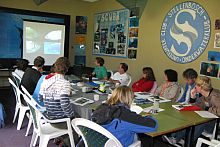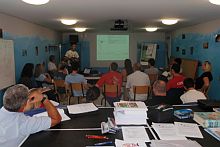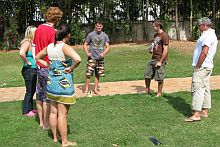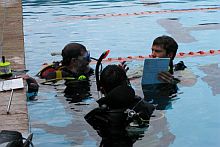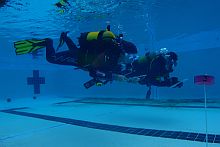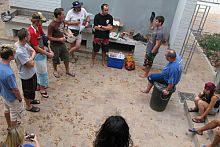Call for citizen scientists to help monitor SA marine resources
|
The FIN reef monitoring programme is a new and exciting citizen science initiative.
FIN plans to get recreational SCUBA divers to assist the South African National Parks (SANParks) with the monitoring and conservation of the marine resources found on the subtidal reefs within the Table Mountain National Park (TMNP) Marine Protected Area (MPA).
Over the past year SAEON Elwandle (the coastal node of the South African Environmental Observation Network), together with the Southern Underwater Research Group (SURG), the World Wide Fund for Nature (WWF), the Table Mountain Fund (TMF) and the SANParks staff from the TMNP MPA have been developing and investigating the feasibility of a volunteer-based reef-monitoring programme.
As part of the programme, recreational SCUBA divers from in and around Cape Town are trained to conduct fish and invertebrate surveys.
This programme follows on from monitoring research that SAEON Elwandle has been facilitating over the last three years around the coast of South Africa. It comes at a time of increasing public awareness of the conservation issues that face the coastal ecosystems in the midst of ever-increasing pressure on the resources and biodiversity through extractive exploitation (fishing), pollution, and climate change.
Long-term monitoring
Long-term monitoring programmes are one of the best ways to document environmental change. Long-term monitoring is generally directed to achieve management objectives, providing data that specifically address management needs for the conservation of the target resources, as well as scientific objectives, which aim to question specific research hypotheses.
How climate change is going to affect coastal ecosystems around the world is a question that is relevant to both resource managers and scientists.
To gain an understanding of how climate change will affect coastal resources, the drivers of change (human exploitation and climate change) need to be viewed separately. In most instances this is not possible as all drivers occur concurrently, but within the borders of MPAs the impact of human exploitation is eliminated. MPAs are recognised globally as core areas to monitor the impacts of climate change in the marine nearshore ecosystems.
Monitoring within MPAs fulfil an additional benefit in that the status of resources outside MPAs can be measured in relation to the status of the stocks within the borders of the MPAs. This can provide valuable information on the success of the management initiatives.
Long-term monitoring faces a number of important challenges. There is a general consensus that science has neither the manpower nor the financial resources to meet the monitoring demands that are being placed upon it.
Volunteers
In response to these challenges, volunteer-based approaches to monitoring have steadily gained recognition. The use of volunteers in long-term monitoring is beneficial to the programme on a number of levels.
Apart from reducing the cost of data collection, the programmes also directly involve stakeholders in the conservation efforts, educating the public about the threats that face the coastal ecosystems that are often taken for granted, and creating a sense of stewardship among the volunteers.
However, in order for volunteers to contribute meaningful monitoring data to the programme they need to be trained and frequently assessed. The development of the training course and the quality control assessment needs to be included in the pilot study, and has to be specific to the needs of the monitoring programme and the environmental conditions where the volunteers will be working.
FIN pilot study
This year saw the start of the FIN pilot study where volunteers from various backgrounds, but with a common interest in conserving the Peninsula’s reef ecosystems, got together for two days of intensive training and testing. A total of 52 divers and 8 SANParks MPA rangers attended one of five training courses hosted by the Underwater Clubs of the University of Cape Town and Stellenbosch University.
The pilot study is set to run for the next six months, during which time the volunteers will be applying their newly learnt skills of identifying and counting fish and invertebrates within the Castle Rocks MPA just south of Simonstown. The results of the pilot study will allow us to optimise the training programme and construct learning curves that can be analysed to determine the precision of the data collected and ensure that the long-term monitoring efforts will produce reliable and valuable trends in the structure of the reef communities.
It is planned that the full FIN monitoring programme will be ready for inception by Easter next year. This will see the monitoring expanded beyond the borders of Castle Rocks, encompassing sites on both the False Bay and Atlantic sides of the Peninsula.
For interested divers who could not participate in the pilot study, the selected dive clubs and schools will be ready to train new volunteers by the time the full programme is set to start. If you would like to find out more about the programme, visit our website at www.fin.org.za
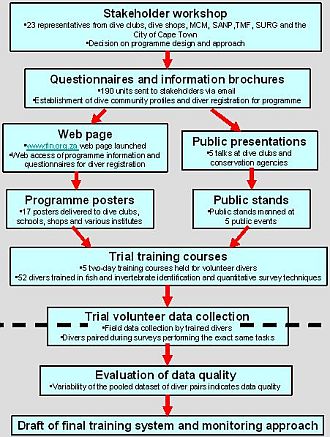 |
Approach chosen for the FIN Volunteer Monitoring Programme and progress to date (indicated by dashed line)
![]()


